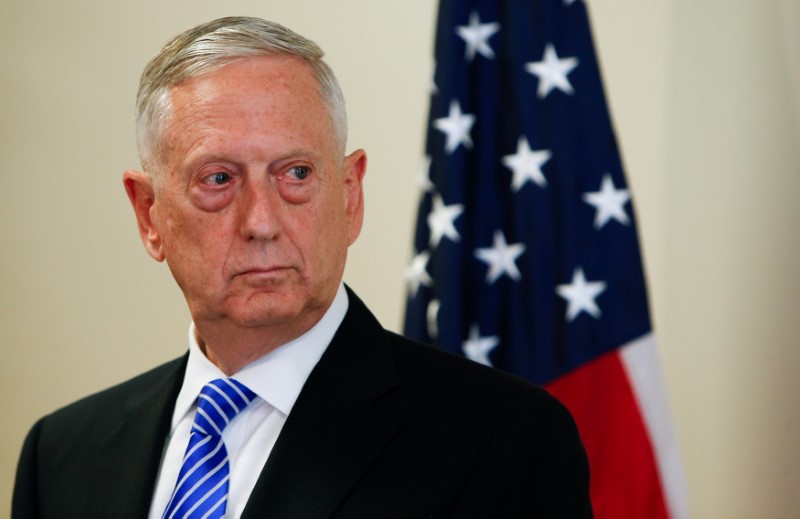By Phil Stewart and Robin Emmott
BRUSSELS (Reuters) - European allies pledged more troops to support Afghanistan's hard-pressed military on Thursday but left details on numbers vague until the United States clarifies its new strategy to break a stalemate with the Taliban.
Despite public fatigue, Europe's latest offer for reinforcements underscores the West's determination to defeat Taliban fighters who harbored al Qaeda militants behind the September 2001 attacks on New York and Washington.
It also reflects a growing realization that the United States and its allies were too hasty in pulling down their large troop presence in 2011, which allowed militants to regain ground and weaken efforts to build Afghanistan's democracy.
"Looking back on it, it's pretty much a consensus that we may have ...reduced the numbers a little too rapidly," U.S. Secretary of Defense Jim Mattis told a news conference following a meeting of NATO defense ministers.
Since drastically drawing down from a peak of more than 130,000 NATO troops in 2011, allies have scrapped an earlier plan to pull out of the country despite the high costs of the United States' longest-running war.
In a closed-door meeting, Mattis pressed NATO allies and non-member partners to provide more personnel to help train the Afghan armed forces. That would add to the 13,450 U.S. and multinational troops involved in training in the country.
NATO commanders are working on the basis of around 1,200 additional troops for next year, diplomats said, but Mattis declined to go into numbers. He said so far he filled 70 percent of the gaps identified by NATO and voiced confidence following his talks in Brussels that "we'll be filling the rest."
"We still have a few gaps and nations are stepping up," Mattis said.
The United States is considering sending up to 5,000 more troops beyond what NATO allies offer, officials say.
"NO TIMELINE"
Britain, Norway and Lithuania were among countries to publicly commit to more personnel. British Defence Secretary Michael Fallon said London would add just under 100 troops, taking its contribution to 585. Spain said it had not made a decision but was ready to help where it could.
"We are in it for the long haul, it's a democracy that has asked for our help and it is important that Europe responds," Fallon said, noting the widening Taliban insurgency across the country and frequent suicide attacks that have hit Kabul.
Some governments declined to offer more, including Canada, which withdrew the last of its troops in 2014.
Progress hung on a new U.S. strategy still being devised and which Mattis is expected to present in mid-July to Donald Trump, after the U.S. president sharply criticized U.S. policy in Afghanistan during his election campaign.
After almost 40 years of conflict in Afghanistan, NATO's will be the latest effort to break what its Secretary-General Jens Stoltenberg called a stalemate, stressing the need for a peace deal involving regional powers.
Several attempts in recent years to broker a settlement between the Western-backed government in Kabul and the Taliban, have all failed. Without the militants at the table, experts say it is hard to envisage a meaningful solution.
The U.S. Director of National Intelligence Dan Coats has also warned the outlook for the country is bleak even with more NATO and U.S. troops.
Mattis did not comment on that intelligence assessment but signaled his long-term support for Afghanistan, declining to say when it might end.

"I don't put timelines on wars," he said, adding the West had learned the consequences of allowing its enemies to plot against it from ungoverned spaces.